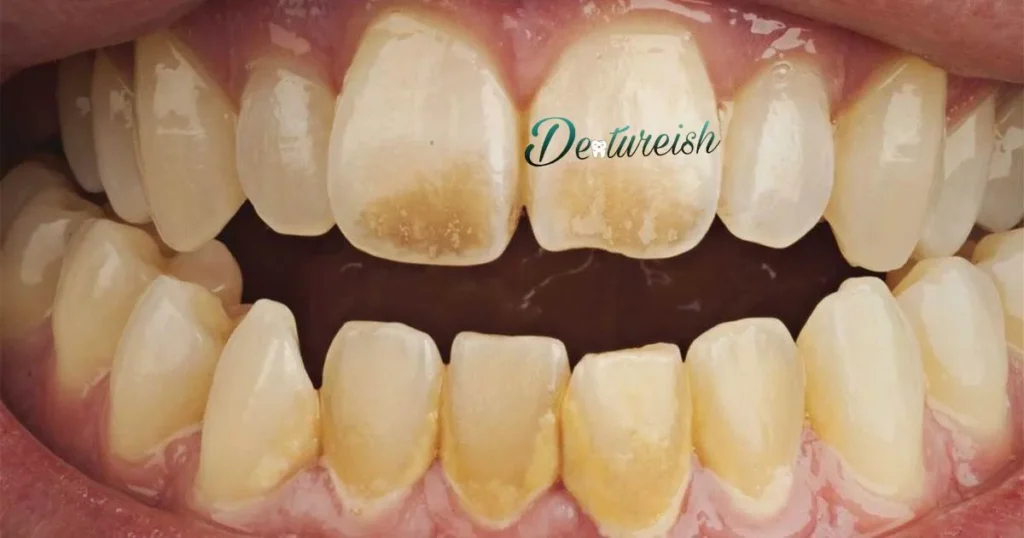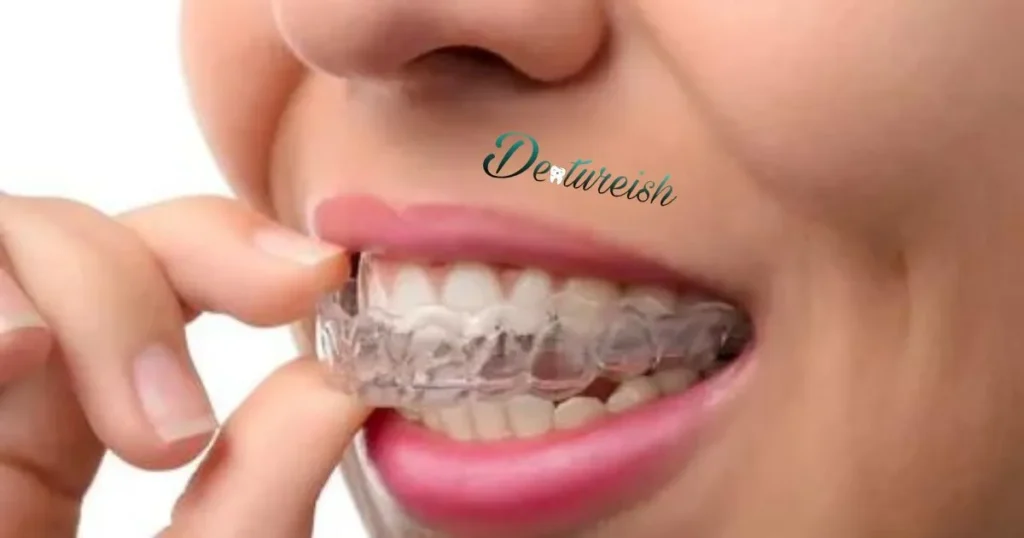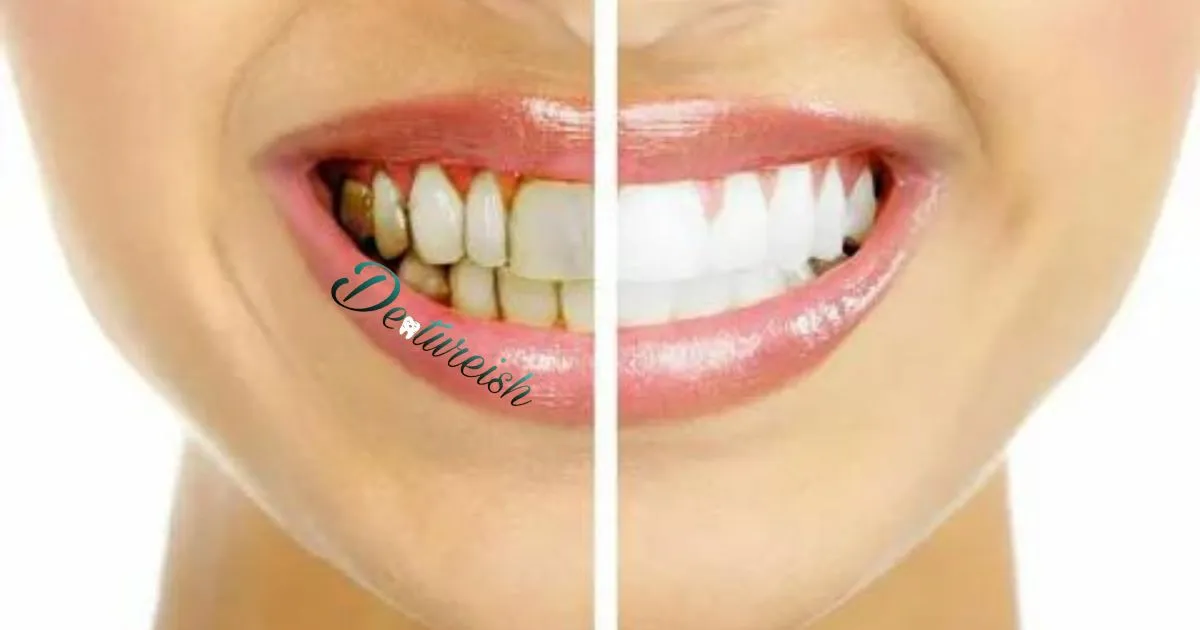Plaque is a sticky film made up of bacteria that builds up on all surfaces in the mouth, including false teeth. If plaque is allowed to accumulate on false teeth, it can lead to tooth decay and gum inflammation. Properly cleaning false teeth is important to remove this plaque buildup.
How to get plaque off false teeth? This is an important question for anyone with removable dental appliances. Allowing plaque to remain on false teeth can cause bad breath, staining, irritation, and other oral health issues. Learning the most effective cleaning methods is key to keeping false teeth fresh and plaque-free.
Regular cleaning is imperative to clear plaque off false teeth and keep them looking their best. This can be accomplished by using specialized denture brushes and cleansers in addition to diligent brushing. Soaking false teeth in cleansing solutions can tackle plaque in hard-to-reach areas. With concerted effort, false teeth can be kept clean and bright.
How To Get Plaque Off Your False Teeth?
To remove plaque from false teeth, brush them thoroughly at least once a day with a soft-bristled toothbrush and non-abrasive toothpaste, soap, or denture cleaner. You can also use denture cleaning tablets or soak false teeth overnight in a solution of baking soda and water to help break down plaque. Using an effervescent tablet or peroxide-based cleaner can also help remove plaque quickly when needed.
Why is plaque bad for your false teeth?

Plaque on false teeth can lead to gum inflammation, fungal infections, bad breath, and tartar buildup. Tartar is hardened plaque that is more difficult to remove and can make false teeth uncomfortable. Plaque also harbors bacteria that can cause decay below the gumline or infections in the mouth.
What causes plaque buildup on false teeth?
5 main causes of plaque buildup on false teeth:
- Not cleaning dentures thoroughly enough – Daily brushing and proper soaking are essential to remove food debris and bacteria that accumulate.
- Eating sugary, starchy, or acidic foods – These let bacteria proliferate and allow plaque to form more readily on denture surfaces.
- Poor oral hygiene – Brushing natural teeth infrequently causes more plaque in the mouth, which then deposits on dentures.
- A lack of professional cleanings – Getting dentures professionally cleaned every 6 months helps prevent substantial plaque and tartar accumulation over time.
- Saliva imbalance – Reduced saliva flow or thicker saliva allows plaque to adhere to dentures more persistently and build up faster.
Regular denture cleaning at home combined with occasional professional cleaning is key to preventing problematic plaque and keeping false teeth fresh. Controlling your diet and maintaining good oral hygiene habits also help reduce plaque buildup.
How often should you clean false teeth to remove plaque?
To prevent plaque buildup and ensure oral health, false teeth should be cleaned at least once daily. For some with more plaque accumulation, cleaning false teeth after meals or twice per day may be needed.
What are the best methods for removing plaque from false teeth?
The best methods for effective plaque removal include brushing with non-abrasive toothpaste or soap, using effervescent denture cleaning tablets, and soaking in solutions like baking soda and water, vinegar, hydrogen peroxide, Polident, or commercial cleansers. Avoid abrasive brushes or cleansers that can damage false teeth.
What Type Of Toothbrush Should You Use On False Teeth To Remove Plaque?
The sources recommend using a soft-bristled toothbrush specifically designed for cleaning dentures and false teeth. Denture brushes often have two sides – one for scrubbing the dentures and one for polishing them. The cross-action bristles can effectively remove up to 99% of plaque from the surfaces of the false teeth1. Standard toothbrushes may be too harsh and damage the false teeth.
Should you use a soft or hard bristle toothbrush on false teeth?
| Bristle Type | Recommendation | Reason |
| Soft | Yes | Less likely to scratch surfaces of false teeth |
| Medium | No | Can wear down and damage false teeth |
| Hard | No | Too abrasive, causes scratches and fractures |
| Extra Soft | Best | Most gentle on delicate false tooth material |
| Denture Brush | Yes | Specifically designed with ultra soft bristles for cleaning dentures |
As the sources indicate, dental professionals strongly advise using only extra soft or soft bristle toothbrushes to clean false teeth like dentures. Hard and even medium brushes can scratch, fracture, and ultimately ruin the shape and function of false teeth over time. Special denture brushes with the softest bristles are the most recommended.
Manual vs electric: Which toothbrush is more effective at plaque removal from false teeth?
Manual soft-bristled denture brushes are generally recommended over electric toothbrushes for cleaning most types of false teeth. However, electric toothbrushes can be used to clean partial dentures while turned off. The sources do not indicate that electric toothbrushes are more effective than manual brushes for plaque removal from false teeth specifically.
How often to replace your false teeth toothbrush?
The sources do not provide a specific timeframe for replacing false teeth toothbrushes. As a general rule, it is recommended to replace manual toothbrushes every 3-4 months and electric toothbrush heads every 2-3 months for optimal cleaning. Check bristles regularly and replace immediately if bent or frayed.
Can You Use Toothpaste To Clean Plaque Off False Teeth?
Specialty denture cleansers or gentle hand soap are better options for cleaning false teeth. If you’re looking to get denture adhesive off dentures, consider using a mild denture cleanser specifically designed for this purpose.
Is regular fluoride toothpaste okay for false teeth cleaning?
Regular fluoride toothpaste is too abrasive for cleaning false teeth and over time can cause microscopic scratches. These scratches allow more plaque to adhere to the dentures, as well as stains. It’s best to use a non-abrasive denture cleanser specifically designed for cleaning false teeth.
Are there specialty false teeth toothpastes that remove plaque better?
Yes, there are specialty denture cleansers and toothpastes formulated specifically for cleaning false teeth. These are non-abrasive and help remove plaque, stains, and bacteria without damaging the dentures. They can be used with soft denture brushes as part of a daily denture cleaning routine.
Should toothpaste be used alone or with a toothbrush to clean false teeth?
Toothpaste should never be used alone to clean false teeth. Even non-abrasive, specialty denture toothpaste should be used gently with a soft denture brush. Using toothpaste alone would not provide the mechanical action needed to effectively remove plaque.
How much toothpaste should be used when brushing false teeth?
Only a small, pea-sized amount of specialty denture toothpaste is needed to lightly brush false teeth. Using too much can make the brushing too abrasive. Gentle circular motions with a soft denture brush and small amount of toothpaste is best.
What Home Remedies Help Get Rid Of Plaque On False Teeth?

There are several effective home remedies to remove plaque buildup from false teeth, including soaking dentures overnight in a baking soda solution, using a vinegar soak, brushing with dish soap, and using ultrasonic cleaners. These methods help break down and lift plaque off the denture surface so it can be more easily brushed away the next morning.
Can baking soda be used to remove plaque from false teeth?
Yes, baking soda is an effective home remedy for removing plaque from false teeth. Simply soak dentures overnight in a solution of 2 teaspoons baking soda mixed with 1 cup warm water. The baking soda has enzymatic properties that help break down plaque so it can be brushed away the next morning.
Do denture cleaning tablets work to remove plaque from false teeth?
Denture cleaning tablets contain cleaning agents specifically designed to remove plaque, food debris, and bacteria from the surface of false teeth. When used regularly according to package directions, these tablets can help prevent plaque buildup and keep false teeth clean.
Are vinegar or lemon juice effective at removing false teeth plaque?
Soaking false teeth in vinegar or lemon juice overnight helps remove plaque buildup thanks to the high acid content. White vinegar in particular works well. After soaking, scrub false teeth with a toothbrush before rinsing to ensure plaque and bacteria are fully removed.
Any other handy home ingredients that can clean plaque off false teeth?
Dish soap or hand soap can be used to effectively clean false teeth and remove plaque. Avoid harsh abrasives like bleach that could damage false teeth. Ultrasonic denture cleaners also use sound waves and cleaning solution to dislodge plaque and debris from the denture surface.
How Often Should You Professionally Clean False Teeth To Remove Plaque?
The ADA recommends getting false teeth professionally cleaned at your regular dental checkups, which are typically every 6 months. More frequent professional cleanings may be needed if you have a lot of plaque buildup. Getting false teeth cleaned every 6 months helps remove plaque and debris that daily brushing and soaking cannot remove.
Should you get false teeth cleaned by a dentist or hygienist regularly?
Yes, the ADA and dental professionals recommend getting false teeth professionally cleaned by a dentist or hygienist every 6 months. They use specialized tools and methods to thoroughly clean false teeth and check for issues that you cannot detect at home. Regular professional cleanings are important for removing plaque and bacteria.
How often is recommended for professional false teeth cleanings?
Dentists recommend getting false teeth professionally cleaned every 6 months, which is the standard recommendation for all regular dental checkups and cleanings. Some people may need more frequent professional cleanings depending on plaque buildup. Getting false teeth cleaned every 6 months helps maintain good oral health.
What methods do professionals use to clean plaque off false teeth?
Dental professionals use specialized denture brushes, ultrasonic cleaners, and hand scalers to thoroughly clean false teeth. They remove plaque, food debris, and bacteria that daily brushing and soaking at home cannot remove. Professionals can polish the false teeth and recommend any needed adjustments.
Are professional false teeth cleanings expensive without insurance?
The cost of professional false teeth cleanings varies by location and provider, but they are typically affordable even without insurance. Many providers offer discounts and payment plans. Getting false teeth professionally cleaned every 6 months is important for oral health and preventing more expensive dental issues.
Frequently Asked Question
Can you brush plaque off false teeth with regular toothpaste?
Yes, use a soft-bristled brush and gentle, non-abrasive toothpaste formulated for dentures.
Will soaking false teeth in baking soda remove stuck-on plaque?
Yes, letting false teeth soak overnight in a baking soda solution helps dissolve plaque buildup.
Is vinegar effective for removing plaque and tartar from false teeth?
Yes, swishing or soaking false teeth in vinegar breaks up plaque and tartar due to the acidity.
Should you use denture cleaning tablets to clean plaque off false teeth?
Yes, effervescent denture cleaning tablets help remove plaque, stains, and kill bacteria.
Is getting false teeth professionally cleaned the best plaque removal method?
Yes, dental hygienists use specialized tools to thoroughly clean plaque and tartar off false teeth.
Conclusion
There are several effective methods to get plaque off false teeth. A baking soda solution helps lift plaque and neutralize acids. Simply soak dentures overnight in a mix of baking soda and warm water. Vinegar also removes plaque buildup thanks to its high acidity. Alternately, brush dentures daily with dish soap and a soft brush.
Commercial cleansers and ultrasonic devices also eliminate plaque safely. Whichever technique you choose, be gentle when scrubbing false teeth as hard brushing can damage surfaces. Daily removal of dentures is also key for allowing gums to rest and heal.
See your dentist if plaque persists despite good cleaning habits, as ill-fitting dentures may need adjustment or replacement. Overall, combining these denture care tips will best remove plaque from false teeth.

